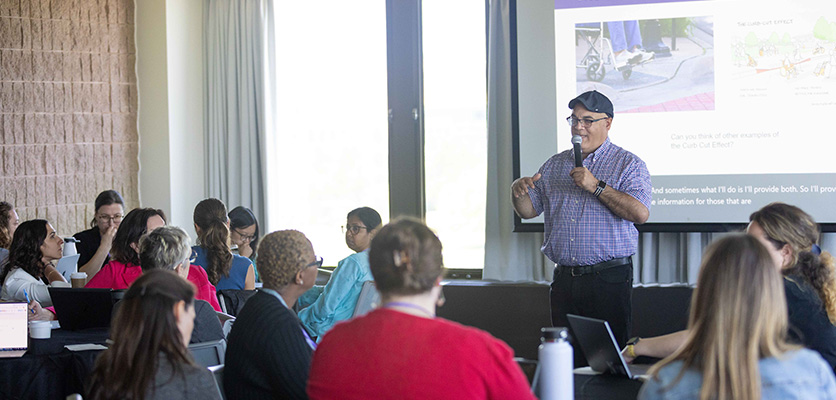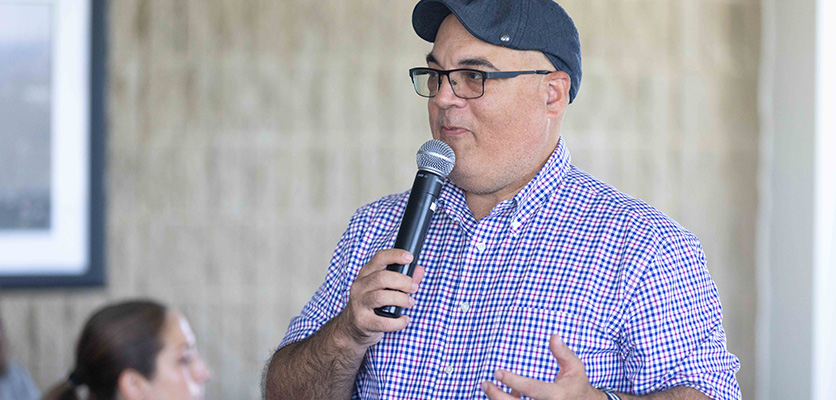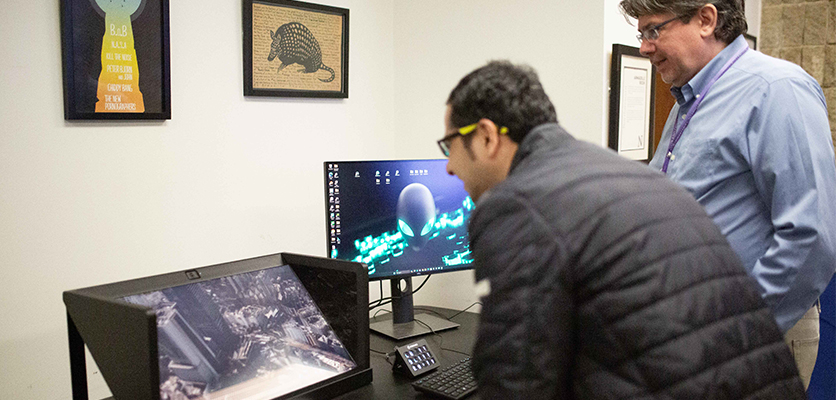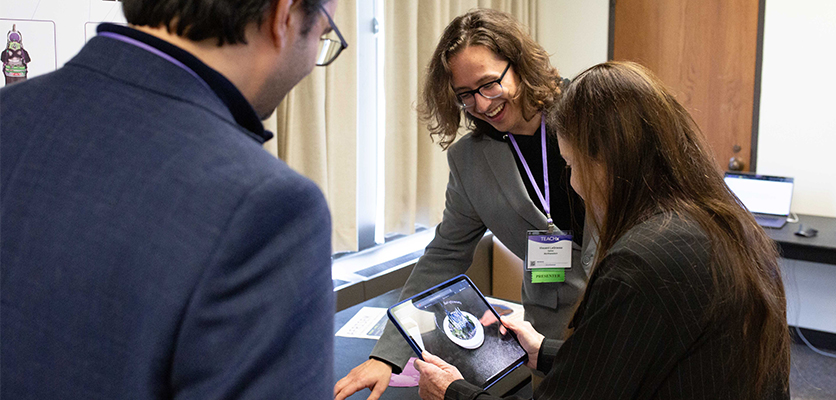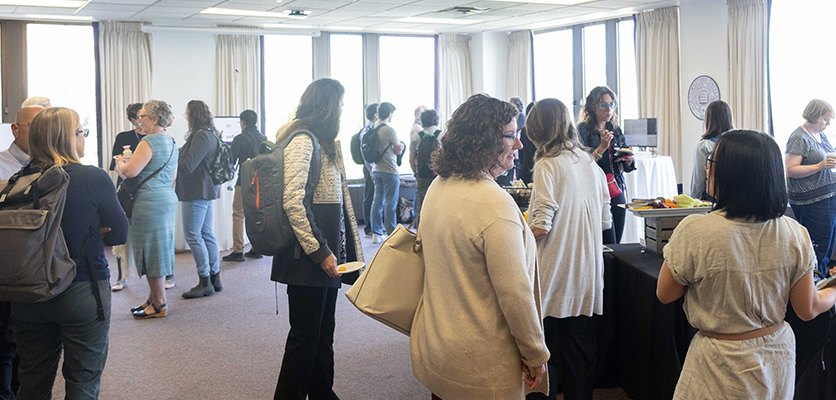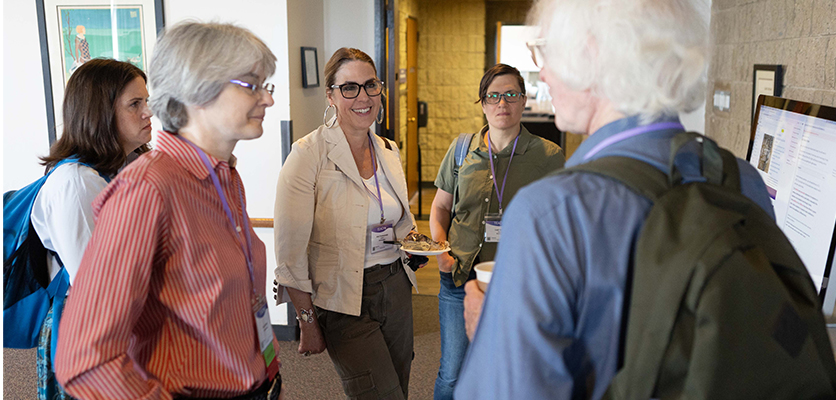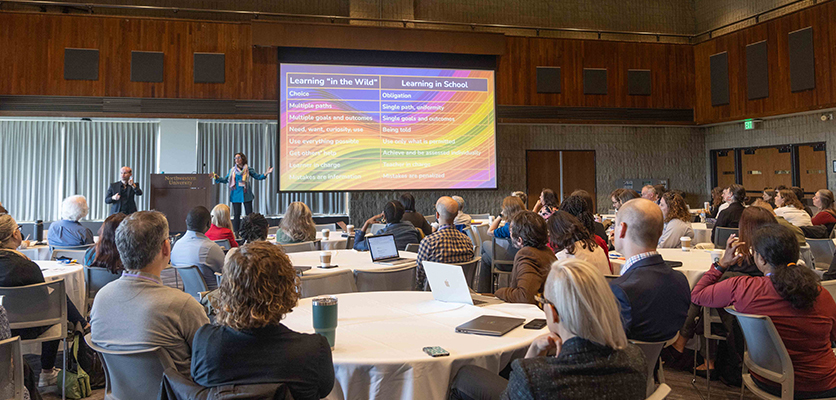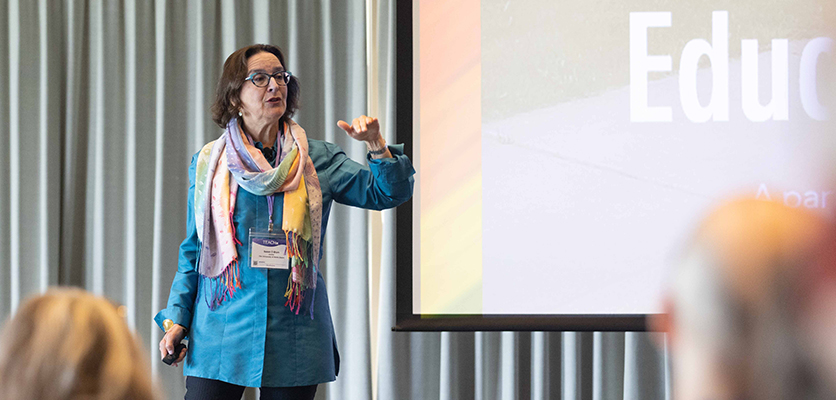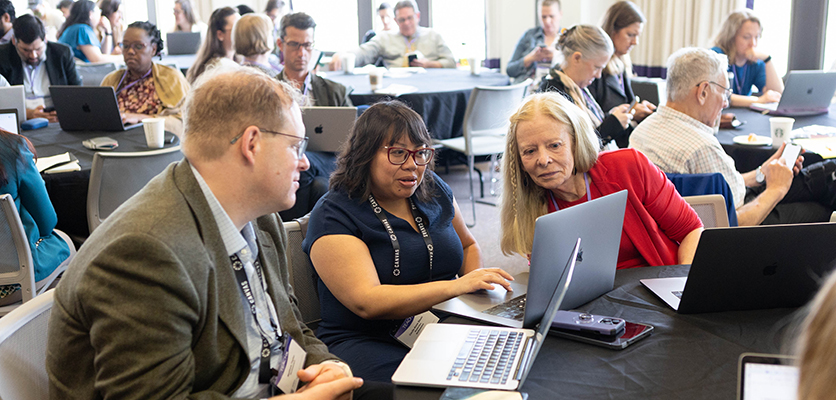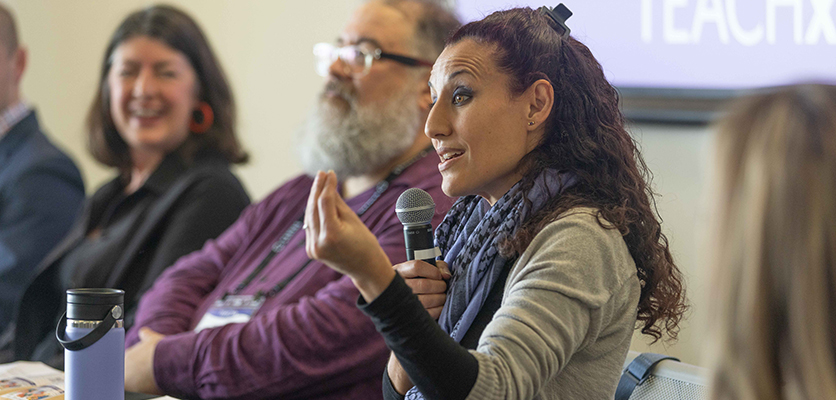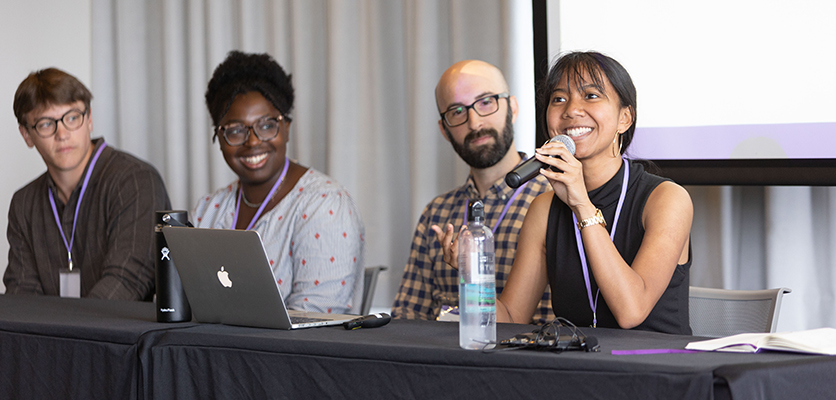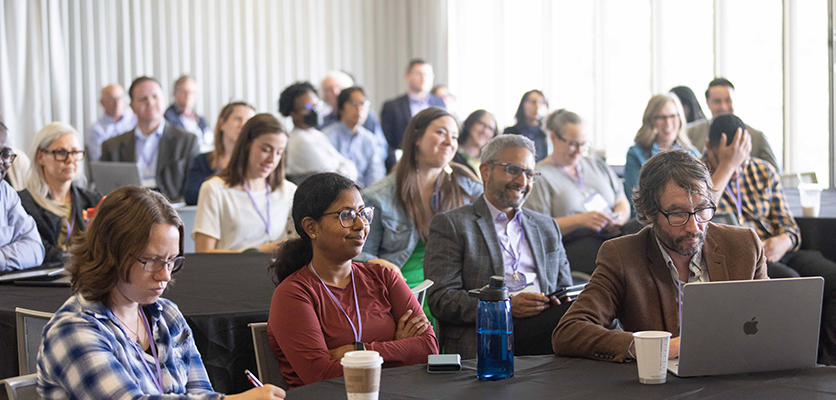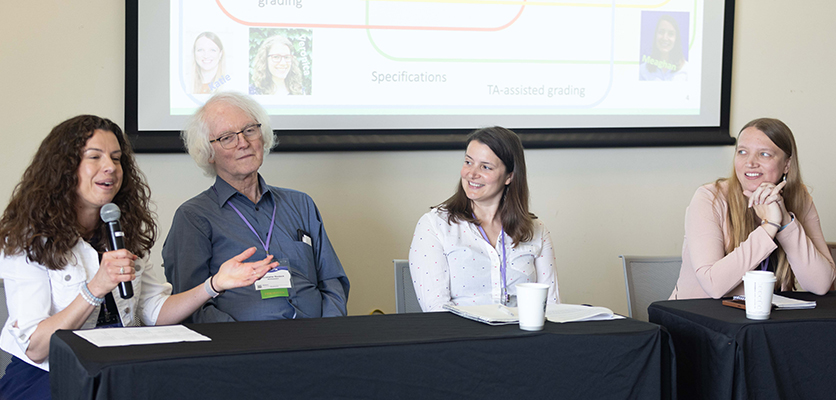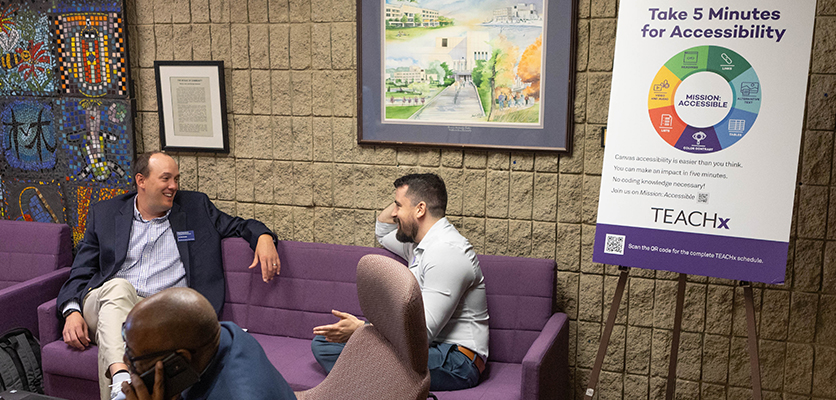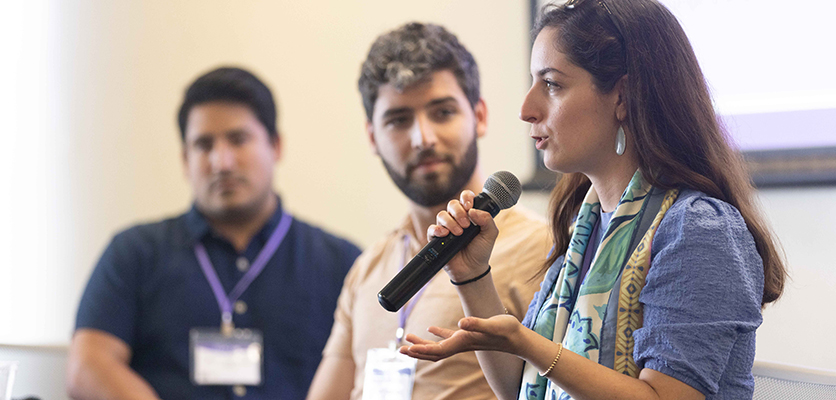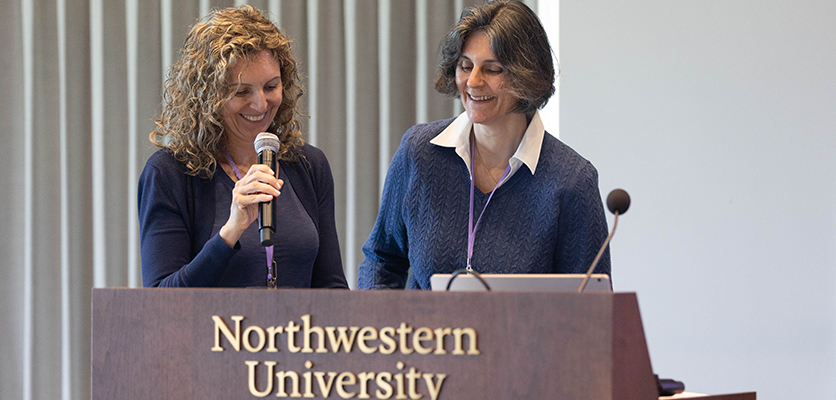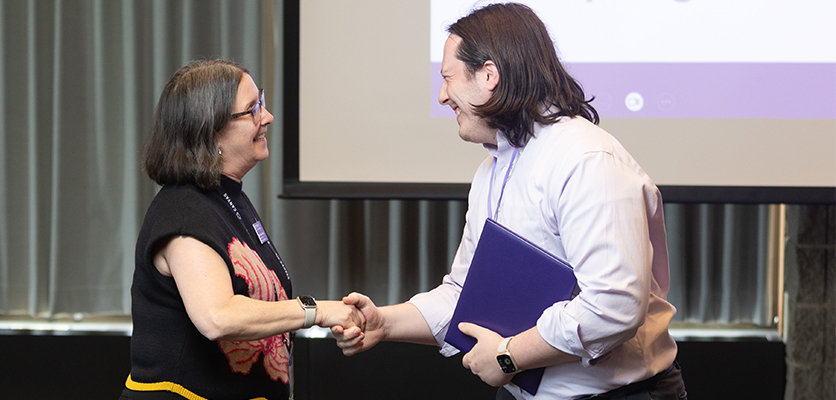TEACHx Explores New and Renewed Norms in Teaching and Learning
Posted Date: May 20, 2024
TEACHx 2024 took place May 15–16 and showcased over 40 sessions in multiple formats, covering various topics selected from a record number of 80 submissions. Over 250 participants attended workshops, panels, and interactive presentations. We invited attendees to reflect on what the current moment in higher education is teaching us about learning and ponder beyond the now to ask what educators need for a successful path forward.
Victoria Getis, senior director of Northwestern IT's Teaching and Learning Technologies (TLT) team and TEACHx founder, noted the buzz of excitement in the air, particularly day one's workshops, which included everything from accessibility to improvisation techniques in teaching. For the first time, participants had the option of focusing their TEACHx experience through coordinated “tracks” designed to allow a deep dive into accessibility and Universal Design for Learning, artificial intelligence, alternative grading and assessment, civil discourse, engagement, active play-based learning, inclusive teaching, language teaching, and wellness. The diversity of topics covered in one conference is partly due to the presenters' variety of academic fields, research interests, and teaching styles. Session leaders represented 13 different institutions, and attendees hailed from more than 15. Getis remarked that the growing reach of participants signals that “TEACHx is taking its place as a regional conference.”
Keynote Key Points
Susan D. Blum, professor of anthropology at the University of Notre Dame, delivered the keynote address on May 16. She has spent decades researching the nature of institutional education, and her work explores cultural, linguistic, and psychological anthropology of teaching and learning. Her talk was titled Authentic, Joyful, Meaningful Learning in College: Is It Possible?
Blum delineated the divide between “schooling,” which can be alienating, mainly due to its focus on traditional grading, assessments, and predetermined, uniform curricular plans, and its near opposite—learning, which she contends is authentic, individual, intrinsic, self-motivated, affirming, and joyful. 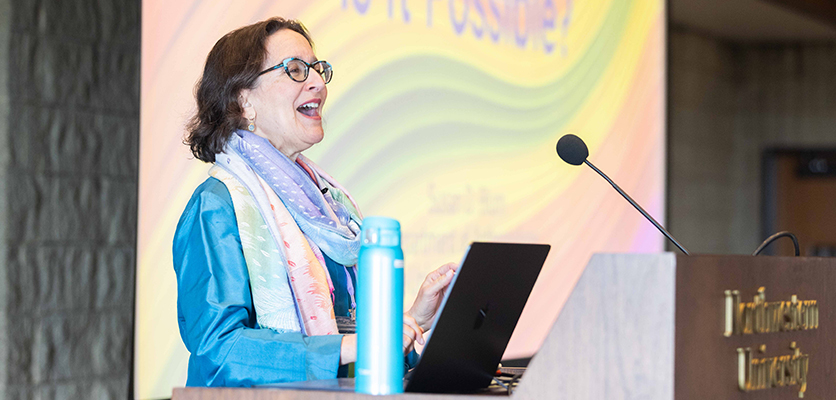 She offered suggestions on how educators can shift to more experiential-based learning and individualized learning plans (determined in large part by students) and eliminate rote grading conventions in exchange for more meaningful and holistic evaluation.
She offered suggestions on how educators can shift to more experiential-based learning and individualized learning plans (determined in large part by students) and eliminate rote grading conventions in exchange for more meaningful and holistic evaluation.
Blum also touched on concerns about how generative artificial intelligence (AI) will shape the future of education and learning. She suggested that rather than a reactive approach to worrying about how to keep AI out of the classroom, we look back to similar moments of concern. She pointed out earlier higher education alarm about the advent of Wikipedia corrupting students' ability to learn research methods and how to evaluate source material. She pointed back further to the long debate over handheld calculators as they advanced to perform more complex computational tasks. Blum’s anthropological framework asks educators to keep their perspectives broad and aim to shift arguments from why AI should or should not be an allowable tool to why, when, and how students and teachers alike can deploy generative AI tools to benefit the natural learning process.
Student Presence and Collaborations
Sparked in part by the tremendous reception to student panels at last year’s event, TEACHx 2024 expanded student involvement to its most substantial extent to date. Students led and co-presented everything from lightning talks to poster sessions, panels, and the highly celebrated interactive augmented reality and virtual reality (AR/VR) room. Student highlights include:
- Jaz Thomasian, a PhD candidate in the Bienen School of Music, shared a digital poster about their podcast, "Pedagogy Pulse."
- Zachary Lewis, Joey McGarry, Yasmeen Mohammed Rafee, and Noelle Robinson, all undergraduate students, joined their instructor—PhD candidate Charles Logan—in a panel to share their exploration of AI, equity, and public education, stemming from a Fall 2023 School of Education and Social Policy course (connected to the TREE Lab) on the same topic.
- Eduardo Alejandro, a PhD candidate in physics and astronomy, presented a popular digital poster titled Inclusive Unit Conversion Activity for STEM Courses.
- Undergraduate social policy and global health major Emily Lester and Noelle Sullivan, a Global Health Studies professor, partnered on a lightning talk, Supporting Northwestern’s Neurodivergent Learners.
- Kat Caribeaux, an art history PhD candidate, and Craig Stevens, an archaeology PhD candidate, work with Northwestern IT’s Media and Technology Innovation team and led interactive AR/VR Reality Room components.
New This Year
Lightning talks were a new addition at the request of previous attendees. The high energy of presenters and the range of innovative and creative topics covered made the talks among the most complimented offerings.
Through the civil discourse track, attendees were given five different opportunities to explore techniques for building their own and their students’ discussion, dialogue, and perspective-taking skills, helping them gain skills in navigating difficult conversations and subjects in the classroom and beyond.
AI Sparks New Questions about Evergreen Concerns and Enthusiasm for Innovation
Associate Professor of Digital Media Design, Northwestern in Qatar, Spencer Striker’s packed presentation, Creativity in the Age of AI: Forging New in Media Education, explored how AI revolutionizes how we design, create, and experience media. Among many enthusiastic audience members for Professor Striker’s talk was Jennifer Keys, senior director of Northwestern's Searle Center for Advancing Learning and Teaching. She raved, “My mind is still reverberating from Professor Spencer Striker’s fascinating demo pulling back the curtain on how AI is transforming digital media design. The audience was captivated by his harnessing the power of generative AI production tools like Midjourney, Kaiber, and ElevenLabs to create a movie sizzler. Students must experience authentic and meaningful learning as they grapple with the complexities.”
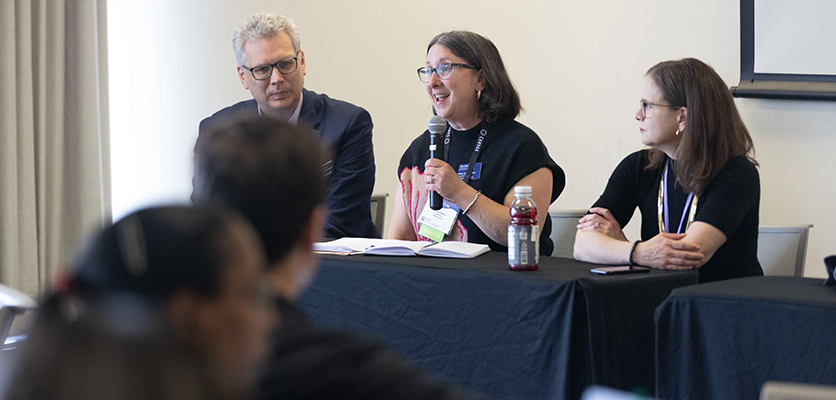 One of TEACHx’s most anticipated sessions, the panel discussion, The AI Horizon at Northwestern, played to a packed house. Abby Rosensweig, a TLT senior learning technologist, moderated the conversation. University leaders Miriam Sherin, associate provost for undergraduate education and chair of the Provost’s Advisory Committee on Generative AI, as well as Ricardo Galliano Court, assistant dean for academic integrity and undergraduate research in the Weinberg College of Arts and Sciences, anchored the conversation and challenged the notion that there should be University-wide determinations made about the use of generative AI at Northwestern. Instead, attendees heard that Northwestern’s colleges, departments, and individual instructors are trusted and encouraged to establish policies and guidelines that best support the desired learning outcomes of their students.
One of TEACHx’s most anticipated sessions, the panel discussion, The AI Horizon at Northwestern, played to a packed house. Abby Rosensweig, a TLT senior learning technologist, moderated the conversation. University leaders Miriam Sherin, associate provost for undergraduate education and chair of the Provost’s Advisory Committee on Generative AI, as well as Ricardo Galliano Court, assistant dean for academic integrity and undergraduate research in the Weinberg College of Arts and Sciences, anchored the conversation and challenged the notion that there should be University-wide determinations made about the use of generative AI at Northwestern. Instead, attendees heard that Northwestern’s colleges, departments, and individual instructors are trusted and encouraged to establish policies and guidelines that best support the desired learning outcomes of their students.
Elizabeth Lenaghan, assistant director of the Northwestern Cook Family Writing Program, The Writing Place, discussed the necessity of understanding the why behind when one might or might not benefit from using AI and balancing that against maintaining one’s authentic voice. Mark Presnell, executive director of career advancement in the Division of Student Affairs, made similar points and explained that students must understand that employers will rely on them to distinguish when and when not to assign tasks to AI, and more importantly, they will need to be able to evaluate AI-generated output for both basic and complex tasks.
The panel’s unifying message was that instructors need not focus on whether students should use AI as a strict matter of policy but instead help students determine when, why, and how using AI is or is not in their best interest. The panelists also noted that students join educators with conflicting views about AI. Many students have reported that they don’t want to use AI, citing concerns ranging from inaccuracy to environmental apprehensions to trepidations about privacy and protecting authoring rights.
My mind is still reverberating from Professor Spencer Striker’s fascinating demo pulling back the curtain on how AI is transforming digital media design. The audience was captivated by his harnessing the power of generative AI production tools like Midjourney, Kaiber, and ElevenLabs to create a movie sizzler. Students must experience authentic and meaningful learning as they grapple with the complexities.”
Jennifer Keys
Senior Director
Searle Center for Advancing Learning and Teaching
Attention to Accessibility
AccessibleNU sponsored the featured workshop, Essential for Some, Helpful for All, led by Luis Pérez, disability and digital inclusion lead, for CAST. The workshop provided a unique opportunity to learn from one of the best in the Universal Design for Learning (UDL) and accessibility fields. The night before the session, Perez was a featured speaker at The White House, celebrating CAST's work on incorporating UDL in the National Ed Tech Plan. Perez offered common-sense and practical approaches to accessibility that resonate with the strategies promoted through Northwestern’s Mission: Accessible challenge.
“Creating accessible learning environments, especially in the digital space, can often be intimidating. Perez’s workshop did an excellent job of helping participants understand why developing accessible environments benefits all individuals by sharing his experiences as a visually impaired individual," said Jim Stachowiack, accessible technology strategy and operations lead, AccessibleNU and Teaching and Learning Technologies. "He also alleviated some intimidation by reassuring people that they don't have to be perfect and encouraging them to continue adjusting their courses and course materials as they learn more.”
Canvas Hall of Fame
TEACHx concluded with the third annual Canvas Hall of Fame, which spotlighted educators who students nominated for excellence in using Canvas. The winners were among the 256 instructors nominated by 499 students, recognizing 388 courses across all 12 Northwestern schools. Miriam Sherin and Jim Stachowiak emceed the ceremony with the French department’s Aude Raymond and Patricia Scarampi, two of the three co-teachers who won the 2023 Most Innovative Course Site award, presenting this year’s winners. The 2024 winners are:
- Aaron Greicius, assistant professor of instruction, in the Department of Mathematics and academic director of the mathematics PhD program in the Weinberg College of Arts and Sciences, received a special certificate of recognition for his outstanding efforts as a champion of student success and his groundbreaking work negotiating vendor contracts to save students over $100,000 in the cost of course materials.
- Eli Kean, assistant professor of instruction in gender and sexuality studies, in the Weinberg College of Arts and Sciences, received an honorable mention. Professor Kean’s Fall 2023 course, Beyond the Binary: Transgender and Race, was nominated in multiple categories.
- Best Use of Video: Erez Levy, visiting associate professor of finance, for his Fall 2023 course, Finance I.
- Excellence in DEI/Accessibility: Rosemary Bush, assistant professor of instruction, Program in Environmental Science, Weinberg College of Arts and Sciences, for her Fall 2023 course, Earth: A Habitable Planet.
- Most Innovative Course Site: Connor Bain, assistant professor of instruction, McCormick School of Engineering and Applied Science, for his Spring 2023 course, Introduction to Computer Programming.
TEACHx Photo Gallery
Photography by Northwestern IT Media and Technology Innovation
What’s Next for TEACHx
Now completing its ninth year, TEACHx has cemented itself as a staple symposium where Northwestern faculty and instructors engage colleagues and peers across the Midwest. It continues to find new ways to innovate and elevate the discourse around teaching and learning, as well as centering the critical role of technology in creating new possibilities for improving pedagogy and educational practices. Victoria Getis beamed with pride for her team’s fantastic work. “I'm delighted about what the Teaching and Learning Technologies team has created and eager to see what comes next.”
